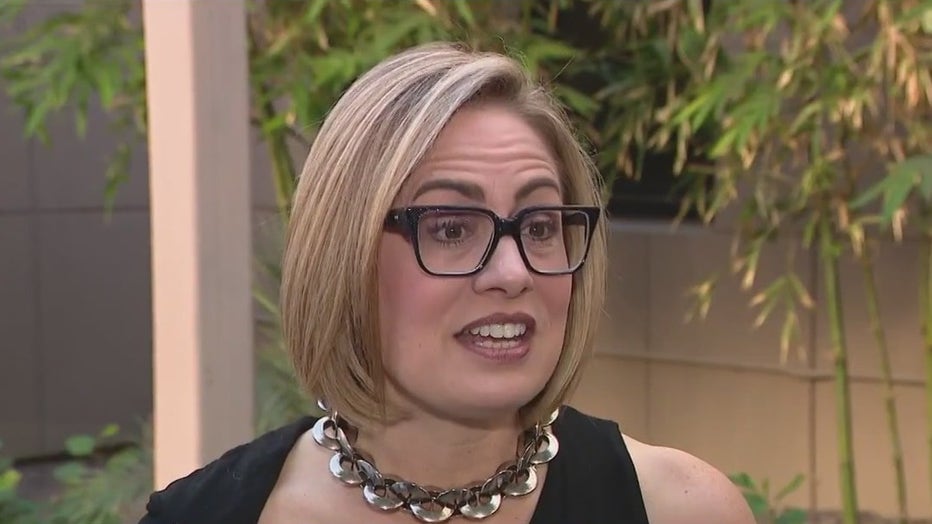2024 Election: Kyrsten Sinema to leave Senate
PHOENIX - Independent Arizona Senator Kyrsten Sinema has announced her decision not to run for re-election.
The Senator, who left the Democratic Party in 2022 to become an independent, issued a statement and an accompanying video message.
"Through listening, understanding, and compromise we delivered tangible results that make America safer, stronger, and more prosperous," Sen. Sinema said, in the video. "Yet, despite modernizing our infrastructure, ensuring clean water, delivering good jobs and safer communities, Americans still choose to retreat farther to their partisan corners."
AZ Sen. Kyrsten Sinema not running for reelection
Political experts are weighing in, after Arizona Senator Kyrsten Sinema said she will leave the U.S. Senate 'at the end of the year.' Sen. Sinema was first elected to the U.S. Senate in 2018, and her decision to not run for reelection avoids a three-way contest in one of the most closely watched 2024 Senate races. FOX 10's Lauren Clark reports.
Sen. Sinema also said she will be leaving the U.S. Senate "at the end of this year," but didn't say when.
"It has been an honor to serve Arizona for the past 20 years," Sen. Sinema said, in the video.
Sinema’s announcement comes after Senate Republicans blocked a bipartisan bill to help secure the U.S.-Mexico border and deliver military aid to Ukraine and Israel, which Sinema spent months negotiating. She’d hoped it would be a signature achievement addressing one of Washington’s most intractable challenges, as well as a powerful endorsement for her increasingly lonely view that cross-party dealmaking remains possible.
Sen. Sinema was first elected to the U.S. Senate in 2018, when Sinema, who was a three-term Congresswoman at the time, defeated Martha McSally in the battle to replace then Sen. Jeff Flake.
Sinema, the first openly bisexual person elected to the Senate, had raised money for a potential reelection campaign and significantly stepped up her public appearances in Arizona throughout 2023, though her activities slowed as her announcement neared. During her five years in office, she built a formidable campaign bank account pegged at $10.6 million on Dec. 31, 2023, but her quarterly fundraising was outpaced by Democrat Ruben Gallego and Republican Kari Lake.
Sen. Sinema's decision not to run has big political impact

Kyrsten Sinema
The decision by Sinema to not run for re-election avoids a three-way contest in one of the most closely watched 2024 Senate races, a hard-to-forecast scenario that spawned fierce debate among political operatives about whether one major party would benefit in the quest for the Senate majority. Most analysts agreed Sinema had faced significant, likely insurmountable hurdles if she’d decided to run.
Republicans have a favorable map in the battle for control of the Senate. Democrats will be forced to defend 23 seats, including Sinema’s and two others held by independents who usually vote with Democrats, compared with just 10 seats for Republicans.
"Once again, I really do believe all eyes could be on Arizona," said Jon Seaton with Camelback Strategy Group. "It’s a 49-51 Senate now, and the 51st seat could very well go through Maricopa County in Arizona. So, I think a lot of national attention, if it wasn’t already, is going to be on Arizona, not just in the presidential campaign level, but also for this United States Senate seat race. I think it will be a very competitive race, with a lot of parties taking a look at it,"
Tom Reilly, who is a professor at Arizona State University's School of Public Affairs, said Sen Sinema's decision was not completely unexpected.
"Since her fundraising was down, she hadn’t begun the collection of signatures required to run as an independent candidate," said Reilly. "I think there was a lot of expectation that perhaps she was not going to run."
"The happiest person in Arizona today is Congressman Ruben Gallego, because he is set with a unified Democratic party behind him against the Republican nominee – no matter who it is – who has to lead a fractured Republican Party," said Stan Barnes with Copper State Consulting.
A poll by Nobel Predictive Insights suggests that Gallego would take a 10-point lead over Republican frontrunner Kari Lake, with 16% undecided. If Sinema was in the race, Gallego's would only have a three-point lead over Lake.
Reilly said how independents vote could be key, and could surprise people on Election Day.
"They are all over the place, you know, from one election to another," said Reilly. "They move in and out of independent status, they switch parties, so I think trying to gauge the independent vote will be a real challenge."
‘Ruben Gallego’s Super Tuesday’
"I think she was looking at the same polling number as we all were, which showed a very, very unlikely path to victory," said Samara Klar, a political science professor at the University of Arizona.
Arizona political consultant, Chuck Coughlin, says it’s a win for Gallego and his campaign.
"Today it was Ruben Gallego’s Super Tuesday. I think the Democrats and Gallego will be celebrating this fact tonight, that they can go embrace those voters and market themselves to those voters that are Democrats," Coughlin said.
Sinema was known to be a key player in negotiating bipartisan bills.
"The back was fractured by the time she decided to pull the trigger to run as an Independent. But, maybe the camel's back on the other side was the immigration stuff," Coughlin remarked.
A bill that failed.
Coughlin says it would be hard to see Sinema backing either Lake or Gallego, but does not believe we’ve seen the last of Sinema this political season.
"She has a following in the state. There is a significant number of people and folks who support her in the state. I believe we will hear more from her probably in this election cycle about what she thinks and that will be interesting to see how that plays out," he said.
(The Associated Press contributed to this report)

